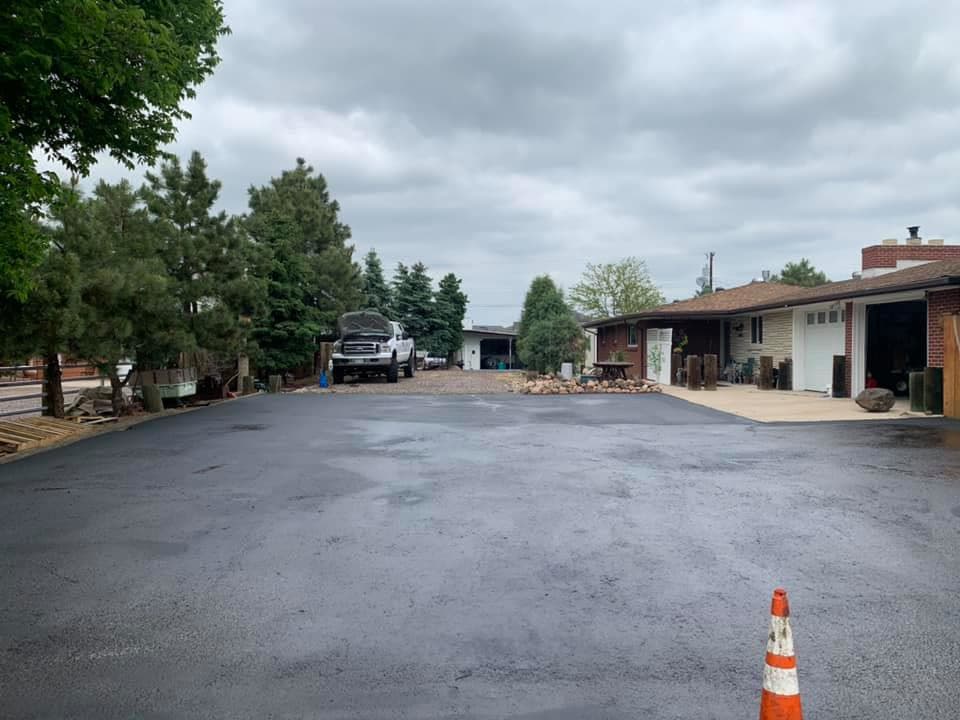
If you’re a homeowner looking to protect your asphalt driveway, you might be wondering, “How long does it take driveway sealer to dry?”. Driveway sealcoating is an important part of asphalt maintenance that helps extend the life of your driveway by creating a barrier that prevents moisture, gasoline, and other fluids from seeping into the porous surface and causing deterioration.
While sealcoating is essential for both residential and commercial asphalt maintenance, it’s important to know how long you need to stay off the driveway after applying the sealer to ensure the best results. This is especially crucial if you’ve recently invested in a new asphalt driveway installation and want to protect your investment.
The time it takes for sealcoating to dry and cure depends on several factors, including:
The best time for asphalt sealcoating is during spring and summer when weather conditions are ideal for faster evaporation and curing. Specifically, you should aim for:
Applying sealer in hot, dry weather allows the sealer to dry and cure more quickly, so you can get back to using your driveway sooner.
So, how long do you need to stay off the driveway after applying sealer? Here’s a general timeline:
If the weather is humid or rainy, it can take much longer for the sealer to dry and cure. High humidity means that the air is more likely to hold moisture, which can slow down the evaporation process. If rain is in the forecast, it’s best to postpone your sealcoating project to ensure the best results.
In humid conditions, it’s a good idea to wait at least 48-72 hours before driving on a sealcoated driveway. If possible, try to schedule your driveway sealcoating for a time when the weather is projected to be warm, dry, and sunny for several days in a row.
Sealcoating is just one part of a comprehensive asphalt maintenance plan. In addition to applying sealer every 2-3 years, it’s important to:
By following these best practices and allowing adequate time for your driveway sealer to dry and cure, you can help extend the life of your asphalt driveway and keep it looking great for years to come.
No, it’s important to repair any cracks, potholes, or other damage to your driveway before applying sealer. Sealcoating is designed to protect the surface of your driveway, but it cannot fill or repair existing damage. Applying sealer over these issues will only result in a smoother appearance, while the underlying problems will continue to worsen.
The lifespan of driveway sealer depends on various factors, such as the quality of the sealer, the application process, and the conditions your driveway is exposed to. On average, a properly applied sealcoat can last between 2-3 years before it needs to be reapplied. However, in harsher climates or with heavy use, the sealer may need to be reapplied more frequently.
It’s not recommended to apply driveway sealer in cold weather, as the low temperatures can prevent the sealer from drying and curing properly. Most manufacturers recommend applying sealer when the temperature is consistently above 50°F, both during the day and at night. Applying sealer in colder temperatures may result in a longer drying time, uneven application, or poor adhesion to the surface.
At Riley Asphalt, we understand the importance of proper asphalt maintenance for both residential driveways and commercial parking lots. Our team of experienced professionals uses high-quality materials and proven techniques to ensure the best results for every sealcoating project, whether you need driveway sealcoating or have recently completed an asphalt driveway installation.
If you still have questions about sealcoat drying or want to schedule a consultation for your driveway or parking lot, contact us today. We’ll be happy to assess your asphalt and provide expert recommendations to help you protect and extend the life of your pavement.
Please complete the form below for a free no-obligation estimate.